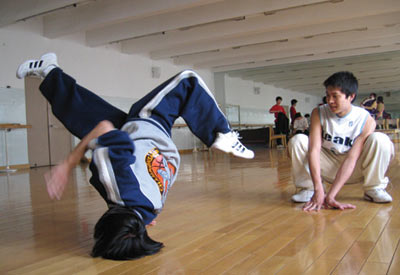| Breaking China |
| http://www.sina.com.cn 2004/11/26 20:31 thats China |
 Breakingdancing From underground clubs to corporate boardrooms, China's breakdancers are making all the right moves By Duncan Willson Breakdancing is a form of acrobatic dance born in New York City in the early seventies. Physically demanding, the dance initially appealed to young gang members looking for ways to best rival gangs without spilling blood. The first breakdancers, or b-boys as they were originally called, hit the floor at the same time that hip-hop music was developing, and breakdancing (or breaking) soon became an integral part of hip-hop culture. By the 1990's, breakdancing was a global phenomenon complete with global champions hailing from France, Hungary and even Korea. Breakdancing is everywhere in China these days, from public squares to underground clubs to the McDonald's China homepage. Yet, the dance is by no means new to China. In fact, soon after breakdancing spread to the suburbs of the United States, the streets of the Middle Kingdom were already home to more than a few b-boys. The Early Days
"The year that Flashdance arrived, everyone went nuts," says Xiao Chuan, a former breakdancing teacher for CCTV. He was 12 years old at the time. Though the1983 film about a steelworker-turned-exotic dancer didn't make its Chinese debut until 1988, it instantly sparked a dance phenomenon that erupted across China's major cities. In the late hours following ballroom dance lessons more contemporary, youth-centered dance performances would take place. Culturally savvy high school and college kids would take over the wide spaces near train stations, bus stops, parks and even the zoo, set up a boombox and lay down their mats. "Even then," remembers Xiao, "Chinese breakdancers were able to do most of the power moves you see today, such as the windmill." But the phenomenon was short-lived. Only a decade had passed since China's ruling communist party had stamped its approval on certain elements of Western society, and the threat of so-called "spiritual pollution" remained very real. Watching their public spaces being slowly overrun with a youth and a culture they lacked the context to effectively manage, education ministers quickly denounced the new art form as "unhealthy" and a crackdown ensued. "If the school found out that you were breakdancing, you'd be disciplined or even kicked out of school," Xiao recalls. After a period of tremendous growth, breakdancing all but disappeared. |
|
|
|
|
|
| Annotation |
| 新闻查询帮助 | |
| 热 点 专 题 | ||||
| ||||
|
教育频道意见反馈留言板 电话:010-62630930-5178 欢迎批评指正
新浪简介 | About Sina | 广告服务 | 联系我们 | 招聘信息 | 网站律师 | SINA English | 会员注册 | 产品答疑
Copyright © 1996 - 2004 SINA Inc. All Rights Reserved
版权所有 新浪网![]() 北京市通信公司提供网络带宽
北京市通信公司提供网络带宽
